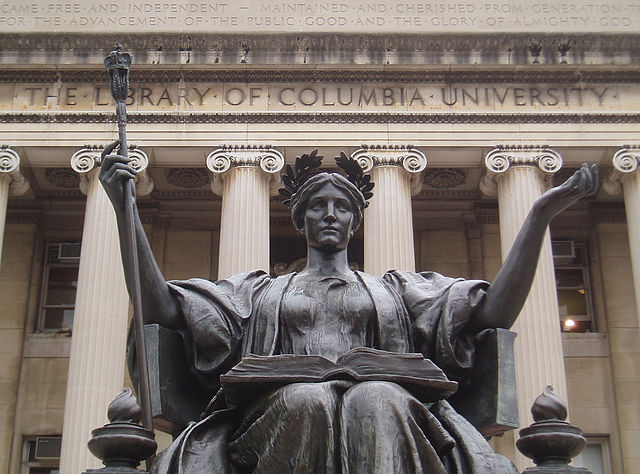
Every so often, Pew surveys the American electorate on their views of important public institutions. This year’s survey found that despite being in power, Republicans are a grumpy bunch. The only major national institution that they feel positively about is churches. That’s not a surprise. However, this might be:
While a majority of the public (55%) continues to say that colleges and universities have a positive effect on the way things are going in the country these days, Republicans express increasingly negative views.
A majority of Republicans and Republican-leaning independents (58%) now say that colleges and universities have a negative effect on the country, up from 45% last year. By contrast, most Democrats and Democratic leaners (72%) say colleges and universities have a positive effect, which is little changed from recent years.
Read that again: a majority of Republicans believe that higher education is bad for America. They’re not just finding fault with certain specific universities, but with academia in general. And it’s not a mere mild dislike: based on the survey results, the only institution that Republicans dislike more is the national media (which comes in at a staggering 85% disapprove/15% approve). Even labor unions, a reliable conservative scapegoat, are less hated than colleges.
This is part of a wave of Republican hostility toward public education. In Wisconsin, the legislature is advancing a bill that would require public universities to “remain neutral on public policy controversies”. An even more appalling law that just passed in Florida allows anyone, however mean-spirited or ignorant, to demand the censorship of any books, movies or other course material they don’t like.
The easy explanation is that this is a backlash against liberal activism on college campuses. It’s true that there have been some high-profile student protests which could have contributed to that perception. However, that theory is too simplistic as a complete explanation. Colleges have had a reputation as hotbeds of progressivism and unorthodox thought since at least the 1960s. But Republicans haven’t always believed that higher education is a blight on the nation. As Pew notes, this is a recent change, and a rapid one at that:
Over the past two years, the share of Republicans and Republican leaners who view the impact of colleges and universities positively has declined 18 percentage points (from 54% to 36%), and this shift in opinion has occurred across most demographic and ideological groups within the GOP.
This shift is too fast and too sweeping to blame it all on Fox News scare stories about college radicals. No, something else has changed in the last few years that’s fueling conservatives’ negative perception of higher education, and I think I know what it is:
[F]irst, an absolute majority of Republicans now reject evolution; second, this wasn’t the case as recently as four or five years ago. Judging by a Gallup poll from June 2012 that reported similar results, it seems as though this shift must have happened within just a two- or three-year period – an incredibly short window to realign the ideology of a major political party.
As I noted in 2014, creationists have become the majority of Republicans within the last five years or so. It’s not coincidental that this change happened in the same timeframe as the decline in their perception of academia. The rejection of evolution (and science and history in general), and the growing scorn for higher education, are two symptoms of an broader anti-intellectual trend in American conservatism. Of course, Donald Trump, the ultimate anti-intellectual politician, is the supreme example.
You could argue that this trend dates back to George W. Bush’s invasion of Iraq, which was supposed to be a swift, painless victory that would result in the installation of a pro-American puppet regime. When that plan failed on every count, many of its supporters chose to retreat into delusion (remember, the phrase “reality-based community” originated as an expression of disdain for Bush’s critics). Reality refused to conform to their expectations, and rather than changing their views, they rejected reality.
But I think its roots reach even deeper. What we’re seeing now is the culmination of a trend that’s been in progress for years, if not decades. Republican politicians have, in a sense, turned their party into a cult. They’ve spent years grooming their followers to only trust ideologically friendly sources of information – but what happened is what always happens in these circumstances. When critical voices are shut out, the only way to compete is by striving to be the truest and purest conservative information source. In the process, their pundits and politicians become progressively more extreme and delusional.
I think intelligent people can have value systems that differ from mine. Despite what you may have heard, I don’t doubt that there are intelligent, thoughtful conservatives and libertarians. But this is something else, something more dangerous. The mindset that’s seized control of much of America is a naked rejection of the idea that facts matter, that there’s any objective truth, or that expertise is relevant.
The GOP’s newfound distaste for higher education is part and parcel of that. It’s not clear what they’d like to see instead – abolish higher education and return to the medieval apprenticeship-and-guild system? – but any action they take based on this belief can only be disastrous. Our prosperity and our future as a civilization depend more than they ever have on an educated, well-informed populace, and instead Republicans are dragging us in the opposite direction. As long as they hold the reins of power, I predict that this will get worse before it gets better.
Image credit: Nowhereman86, released under CC BY 3.0 license; via Wikimedia Commons